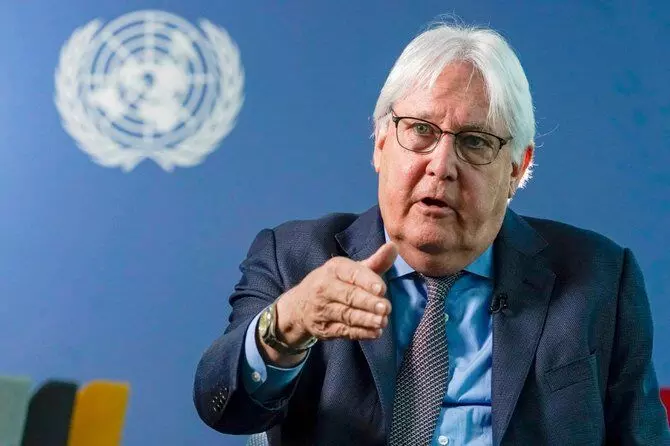
6 million Afghans on the brink of famine, warns UN as crisis worsens
text_fieldsUnited Nations: The UN humanitarian chief on Monday asked donors to restore financial support for economic development and urgently provide $770 million to help Afghans get through the winter as the United States argued with Russia and China over who should pay. The UN humanitarian chief warned that Afghanistan faces deepening poverty with 6 million people at risk of famine.
According to Martin Griffiths, Afghanistan is dealing with numerous issues, including those related to the economy, the environment, hunger, and the financial situation.
He noted that while conflict, poverty, climatic shocks, and food insecurity "have long been a sad reality" in Afghanistan, the suspension of significant development assistance since the Taliban takeover a year ago makes the current situation "so critical."
24 million Afghans, or more than half the country's population, are in need of assistance, and close to 19 million are experiencing severe food insecurity, according to Griffiths. Furthermore, "we worry" that the numbers will soon worsen due to the winter weather, which would drive up already high fuel and food prices even higher.
Despite the difficulties, he claimed that over the previous year, UN agencies and their NGO partners have mounted "an unprecedented response," reaching approximately 23 million people.
He said that an extra $154 million is needed to stockpile food and other supplies before the weather restricts access to some locations and that $614 million is urgently needed to prepare for winter, including repairing and renovating shelters and providing warm clothes and blankets.
Griffiths stressed, however, that "humanitarian aid will never be able to replace the provision of system-wide services to 40 million people across the country."
The Taliban "have no budget to invest in their own future," he said, and "it's clear that some development support needs to be started."
Since more than 70% of Afghans reside in rural regions, Griffiths issued a dire warning: "millions of lives and livelihoods will be risked, and the country's capacity to produce food imperilled" if agriculture and animal production are not protected.
He noted that the enormous difficulty of doing foreign financial transactions as well as the nation's banking and liquidity crisis must also be addressed.
"The consequences of inaction on both the humanitarian and development fronts will be catastrophic and difficult to reverse," Griffiths warned.
On the night of the first anniversary of the US pullout from Afghanistan, Russia convened a meeting of the UN Security Council, and its envoy, Vassily Nebenzia, harshly denounced the US and its NATO allies for their "ignominious 20-year campaign."
He said that they accomplished nothing to improve the Afghan economy and that by being there, they simply helped to solidify the nation's reputation as a "hotbed of terrorism" and a place where drugs are produced and distributed.
Nebenzia claimed that the United States and its allies left Afghans to deal with "ruin, poverty, terrorism, hunger, and other challenges."
They cut off Afghan financial resources and its central bank's connection to SWIFT, the main system for international financial transactions, he claimed, "Instead of acknowledging their own mistakes and supporting the reconstruction of the destroyed country".
Zhang Jun, China's ambassador to the UN, also charged that by stopping development aid, freezing Afghan assets, and enforcing "political isolation and blockade," the US and its allies were "evading responsibility and abandoning the Afghan people."
The Taliban, according to US Ambassador Linda Thomas-Greenfield, increased taxes on desperately needed aid while enforcing policies that "repress and starve the Afghan people instead of protecting them."
She questioned how the Taliban, who are not recognised by any nation, expected to forge contacts with the rest of the world while offering Ayman Al-Zawahiri a safe haven in the middle of Kabul. On July 31, a US drone strike resulted in his death.
Nevertheless, Thomas-Greenfield claimed that with more than $775 million in humanitarian aid given to Afghans in the nation and the surrounding area in the previous year, the United States is the world's largest donor to Afghanistan.
Regarding the frozen assets in Afghanistan, President Joe Biden declared in February that $7 billion in US funds were being split: $3.5 billion would go to a UN trust fund to benefit Afghans, and $3.5 billion would go to the families of Americans who perished in the 9/11 terrorist attacks, Arab News reported.
"No country that is serious about containing terrorism in Afghanistan would advocate giving the Taliban instantaneous, unconditional access to billions in assets that belong to the Afghan people," Thomas-Greenfield said.
Thomas-Greenfield responded to Russia's assertions that the West and not the Taliban is to blame for Afghanistan's troubles by asking, "What are you doing to help other than rehash the past and criticise others?"
She claimed that Russia's contribution to the UN humanitarian appeal for Afghanistan was mere $2 million and that China's donations "had been similarly underwhelming".
"If you want to talk about how Afghanistan needs help, that's fine. But we humbly suggest you put your money where your mouth is," Thomas-Greenfield said.
Russia's Nebenzia took the floor again, calling the suggestion "stunning."
"We are being asked to pay for the reconstruction of a country whose economy was essentially destroyed by 20 years of US and NATO occupation?" he asked. "You are the ones who need to pay for your mistakes. But first of all, you need to return to the Afghan people the money that has been stolen from them."
Finally, the US ambassador Thomas-Greenfield said, "If the Russian Federation believes that there was an economy in Afghanistan to be destroyed, it's been destroyed by the Taliban."























